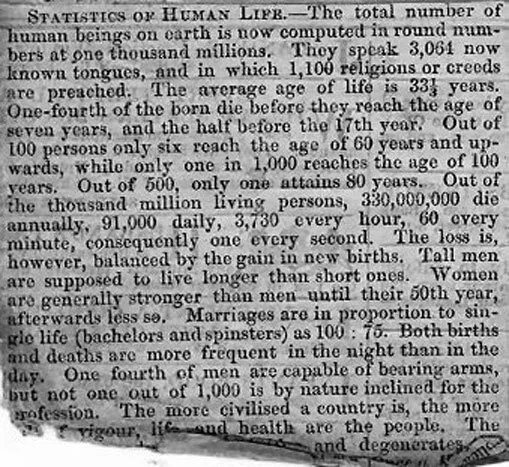For convenience some of the data in this article is represented in the Table below
Statistics of Human Life early 19th Century
Population = 1 Billion
Known Languages = 3,064
Religions or Creeds = 1,100
Average Life Expectancy = 33 years
Mortality Rate - Age in years % Rate
7 years old = 75%
17 years old = 50%
60 years old = 6%
80 years old = 0.5%
100 years old = 0.1%
Time Period - Death Rate (people)
Annually = 330 million deaths
Daily = 91,000 deaths
Every Hour = 3,730 deaths
Every Minute = 60 deaths
Every Second = 1 death
STATISTICS OF HUMAN LIFE.
- The total number of human beings on the earth is now computed in round numbers at one thousand millions. They speak 3,064 now known tongues, and in which upwards of 1,100 religions or creeds are preached. The average age of life is 33 years. One fourth of the born die before they reach the age of seven years, and half before their 17th year. Out of 100 persons only six reach the age of 60 years and upwards, while only one in 1,000 reaches the age of 100 years. Out of 500 only one attains 80 years. Out of the thousand million living persons 330,000,000 die annually, 91,000 daily, 3,730 every hour, 60 every minute, consequently one every second. The loss is, however, balanced by the gain in new births. Tall men are supposed to live longer than short ones. Women are generally stronger than men until their 50th year, afterwards less so. Marriages are in proportion to single life (bachelors and spinsters) as 100:75. Both births and deaths are more frequent in the night than in the day. One fourth of men are capable of bearing arms, but not one out of 1,000 is by nature inclined for the profession. The more civilised a country is, the more full of vigour, life, and health are the people. The notion that education enfeebles and degenerates the human frame is not borne out by fact. –
Once a week.
Based on historical estimates of world population this article uses data that would have been published prior to the 1850s. However, the publication `Once a Week' was published between 1859-1880.
